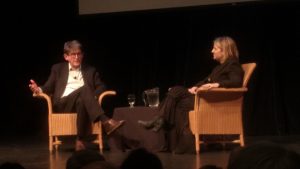
BY ROBERT KOUMARELAS
In a time where journalists are being accused of “fake news”, and competing with the all-encompassing internet for facts versus fiction, things seem bleak for those hopeful to continue being the watchdogs of society.
Veteran journalist Alan Rusbridger however, wants news hunters to “treat journalism as a public service,” advocating that journalism of all kinds is vital to the well-being of citizens.
Rusbridger arrived in Toronto in early November to promote his new book Breaking News: The Remaking of Journalism and Why it Matters Now. While in Toronto, he stopped for a CBC Radio interview with The Current’s Anna Maria Tremonti. Later he answered some questions from moderator Irene Gentle, editor of the Toronto Star at the Isabel Bader Theatre as part of the CJF’s Journalism Matters talks.
There he spoke before a crowd of journalists and writers, both old and new, and talked about his experiences in the stories and how news used to be conducted before the internet flood over the world. “The world used to be arranged on a vertical axis. If you were one of the lucky ones who owned a printing press or a broadcasting station, then you were almost literally above your leaders…and we would hand down our newspapers to them.”
He then explained that sending information and news was now on a vertical axis, in that everyone had the same level of access to send information and stories and communicate around the world. And because of this, there was less trust in what actual journalists were saying, and more so in who would write blogs and tweets which had some aspects of proper journalism, but weren’t actual journalists, and could misinform or even outright lie.
“About 50 per cent of people are disengaged with news because they just really don’t know who to trust. About two-thirds of people say they can no longer tell what’s a good source and what’s not a good source, and that seems to be really frightening,” warned Rusbridger.
Rusbridger, who lived through a revolution in which news was conducted from print to the web, talked about strategies for new journalists in which the industry may be changing yet again. “If you’re not trying to innovate and understand this new world that we live in, then you’re almost guaranteed to fail.”
Rusbridger was an editor at The Guardian for 20 years, taking part in investigations into Wiki Leaks, Britain’s phone hacking scandal, and worldwide NSA surveillance programs on behalf of the U.S. government, all of which shook the western world. In his 20-year career, he was among the first journalists that transitioned from print newspaper to news website with the beginning of the world wide web.
If anyone at Sheridan is interested in the future of the journalism industry, on Jan. 31 at the Isabel Bader Theatre, the CJF is hosting a Journalism Matters talk: Driving Innovation in Media. The talk will feature Inga Thordar and Aron Pilhofer.
